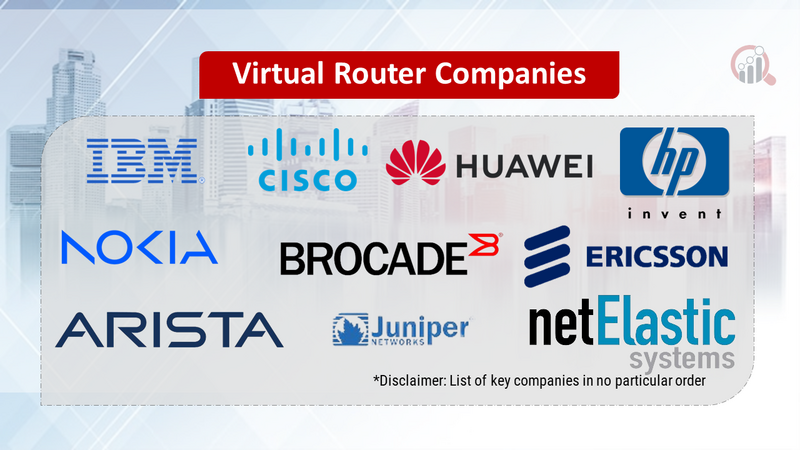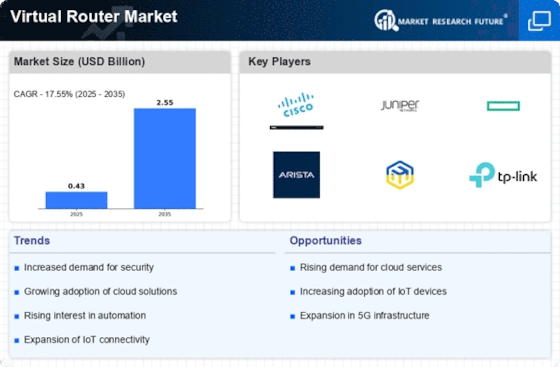Top Industry Leaders in the Virtual Router Market

The Virtual Router Market: Navigating the Digital Crossroads
The virtual router market, projected to reach a robust growth by 2028, is reshaping network management with its software-based approach. Understanding the competitive landscape in this burgeoning space is key for both established players and newcomers.
Key Players:
- IBM Corporation (US)
- Cisco Systems (US)
- Ericsson Inc. (US)
- Huawei Technologies Co.Ltd. (US)
- Nokia Corporation (Finland)
- Juniper Networks Inc. (US)
- netElastic Systems Inc. (US)
- Brocade Communications Systems (US)
- Hewlett Packard Enterprise Company (US)
- Arista Networks Inc. (US)
Strategies for Success:
-
Performance and Scalability: Delivering high throughput, low latency, and the ability to handle large, dynamic network workloads is essential. Players compete on speed, efficiency, and resource optimization.
-
Security and Reliability: Virtual routers handle sensitive data, making robust security features and operational reliability non-negotiable. Advanced threat detection, encryption, and redundancy protocols are crucial differentiators.
-
Openness and Integrations: Compatibility with diverse network environments and seamless integration with existing infrastructure are critical for wider adoption. Open APIs and support for industry standards foster ecosystem partnerships.
-
Cloud-Native Focus: Optimizing virtual routers for cloud deployments, with automated provisioning, orchestration, and management capabilities, caters to the growing cloud workload trend.
Factors for Market Share Analysis:
-
Feature Functionality: Comprehensive feature sets addressing specific use cases and customer needs – such as advanced routing protocols, traffic shaping, and network virtualization capabilities – influence market share.
-
Pricing and Licensing Models: Flexible pricing options, subscription models, and open-source alternatives shape competition. Players target different customer segments with strategic pricing approaches.
-
Ease of Deployment and Management: User-friendly interfaces, automated configuration tools, and intuitive management platforms make virtual routers attractive. Simplicity and efficiency are key differentiators.
-
Community and Support: Strong developer communities, robust documentation, and comprehensive technical support build trust and foster customer loyalty. A vibrant ecosystem of support resources is crucial.
New and Emerging Companies:
-
Software-Defined Network (SDN) Specialists: Companies like Pluribus Networks and Nutanix are bringing their SDN expertise to the virtual router market, offering highly programmable and customizable solutions.
-
Container-Based Providers: Players like Isovalent and Cilium are pioneering containerized virtual routers, enabling seamless integration with containerized applications and Kubernetes environments.
-
Security-Focused Players: Companies like Zscaler and Palo Alto Networks are entering the market with virtual routers embedded with advanced security features, catering to security-conscious organizations.
Current Investment Trends:
-
Focus on Automation and Orchestration: Companies are investing in automated deployment, configuration, and management tools to simplify virtual router operations and reduce manpower requirements.
-
Integration with AI and Machine Learning: AI-powered traffic analysis, anomaly detection, and self-healing capabilities are being integrated into virtual routers for proactive network management and enhanced user experience.
-
Expansion into Cloud and Edge Computing: Optimizing virtual routers for cloud and edge deployments, along with containerization and microservices support, is shaping investment priorities.
-
Security Feature Enhancement: Advanced encryption, zero-trust security models, and threat intelligence integration are critical areas of investment as cybersecurity concerns rise.
The virtual router market is a dynamic space with evolving player positioning and technology advancements. Staying informed about key players, emerging trends, and shifting market dynamics will be crucial for navigating this digital crossroads and maximizing success.
Latest Company Updates:
-
October 30, 2023: Cisco unveils its Cloud Native Embeddable Virtual Router (CnE VR), designed for high-performance and secure routing within cloud-native environments. -
November 15, 2023: VMware announces enhancements to its NSX Virtual Routing platform, including improved scalability and support for multi-cloud deployments. -
December 18, 2023: Juniper Networks introduces its Contrail Edge Cloud, a unified platform offering virtual routing and other network virtualization features for edge deployments.










